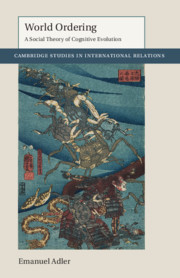Crossref Citations
This Book has been
cited by the following publications. This list is generated based on data provided by Crossref.
Stewart, Megan
and
Kitchens, Karin
2018.
Statebuilding, Social Order and Violence: Evidence from U.S. Reconstruction.
SSRN Electronic Journal,
Drieschová, Alena
2019.
The Multiplicity Straightjacket.
New Perspectives,
Vol. 27,
Issue. 3,
p.
155.
Adler, Emanuel
2020.
Control power as a special case of protean power: thoughts on Peter Katzenstein and Lucia Seybert'sProtean Power: Exploring the Uncertain and Unexpected in World Politics.
International Theory,
Vol. 12,
Issue. 3,
p.
422.
Banerjee, Kiran
and
MacKay, Joseph
2020.
Communities of practice, impression management, and great power status: Military observers in the Russo-Japanese War.
European Journal of International Security,
Vol. 5,
Issue. 3,
p.
274.
Wiener, Antje
2020.
The Contested Freedom of the Moderns: Conceiving Norm Contestation as the ‘Glue’ for Re-Ordering the Globalized World.
SSRN Electronic Journal,
Guzzini, Stefano
2020.
Protean power as a plea for an open social ontology, non-efficient causal explanations, and cautious political practice.
International Theory,
Vol. 12,
Issue. 3,
p.
449.
Jackson, Patrick Thaddeus
2020.
The dangers of interpretation: C.A.W. Manning and the “going concern” of international society.
Journal of International Political Theory,
Vol. 16,
Issue. 2,
p.
133.
Sundaram, Sasikumar S
2020.
The Practices of Evaluating Entitlements: Rethinking “Reputation” in International Politics.
International Studies Quarterly,
Vol. 64,
Issue. 3,
p.
657.
HOFIUS, MAREN
2020.
Towards a ‘theory of the gap’: Addressing the relationship between practice and theory.
Global Constitutionalism,
Vol. 9,
Issue. 1,
p.
169.
Pratt, Simon Frankel
2020.
Reification, practice, and the ontological status of social facts.
International Theory,
Vol. 12,
Issue. 2,
p.
231.
Kornprobst, Markus
2020.
African agency and global orders: the demanding case of nuclear arms control.
Third World Quarterly,
Vol. 41,
Issue. 5,
p.
898.
Zürn, Michael
2020.
Unknown effects of social innovations.
International Theory,
Vol. 12,
Issue. 3,
p.
471.
Kumral, Mehmet Akif
2020.
Exploring Emotions in Turkey-Iran Relations.
p.
307.
Katzenstein, Peter J.
2020.
Protean power: a second look.
International Theory,
Vol. 12,
Issue. 3,
p.
481.
Guzzini, Stefano
2020.
Embrace IR Anxieties (or, Morgenthau's Approach to Power, and the Challenge of Combining the Three Domains of IR Theorizing).
International Studies Review,
Vol. 22,
Issue. 2,
p.
268.
Schmitt, Olivier
2020.
How to challenge an international order: Russian diplomatic practices in multilateral security organisations.
European Journal of International Relations,
Vol. 26,
Issue. 3,
p.
922.
MacKay, Joseph
2020.
Social practices of rule-making in world politics.
Cambridge Review of International Affairs,
Vol. 33,
Issue. 3,
p.
452.
Pouliot, Vincent
2020.
Historical Institutionalism Meets Practice Theory: Renewing the Selection Process of the United Nations Secretary-General.
International Organization,
Vol. 74,
Issue. 4,
p.
742.
Hofius, Maren
2021.
Perspectives on International Political Theory in Europe.
p.
87.
Adler, Emanuel
and
Drieschova, Alena
2021.
The Epistemological Challenge of Truth Subversion to the Liberal International Order.
International Organization,
Vol. 75,
Issue. 2,
p.
359.



